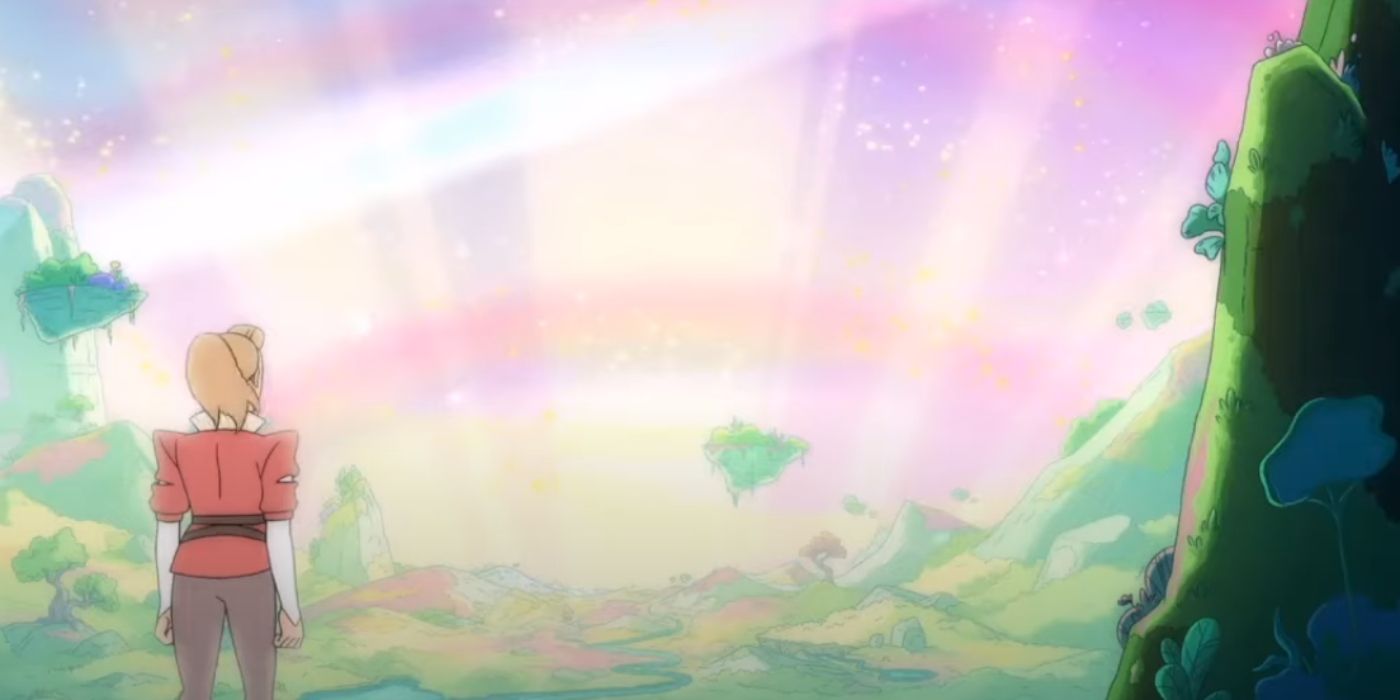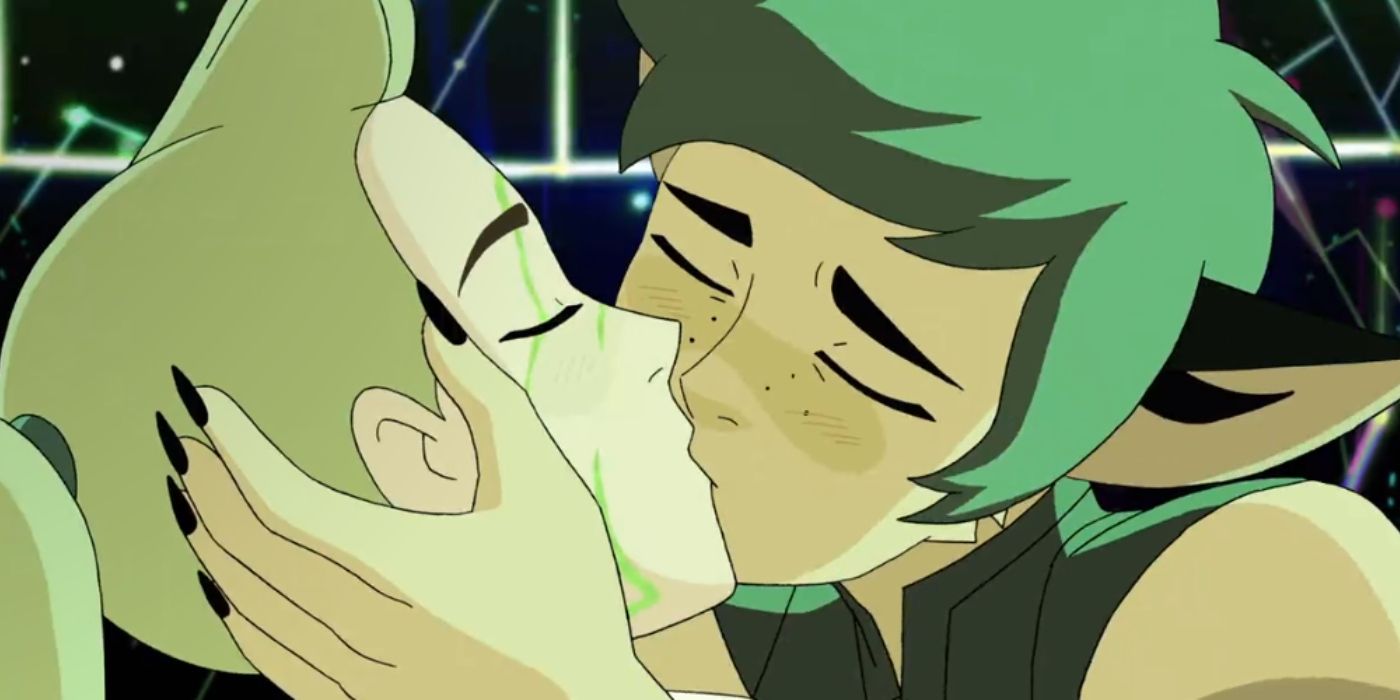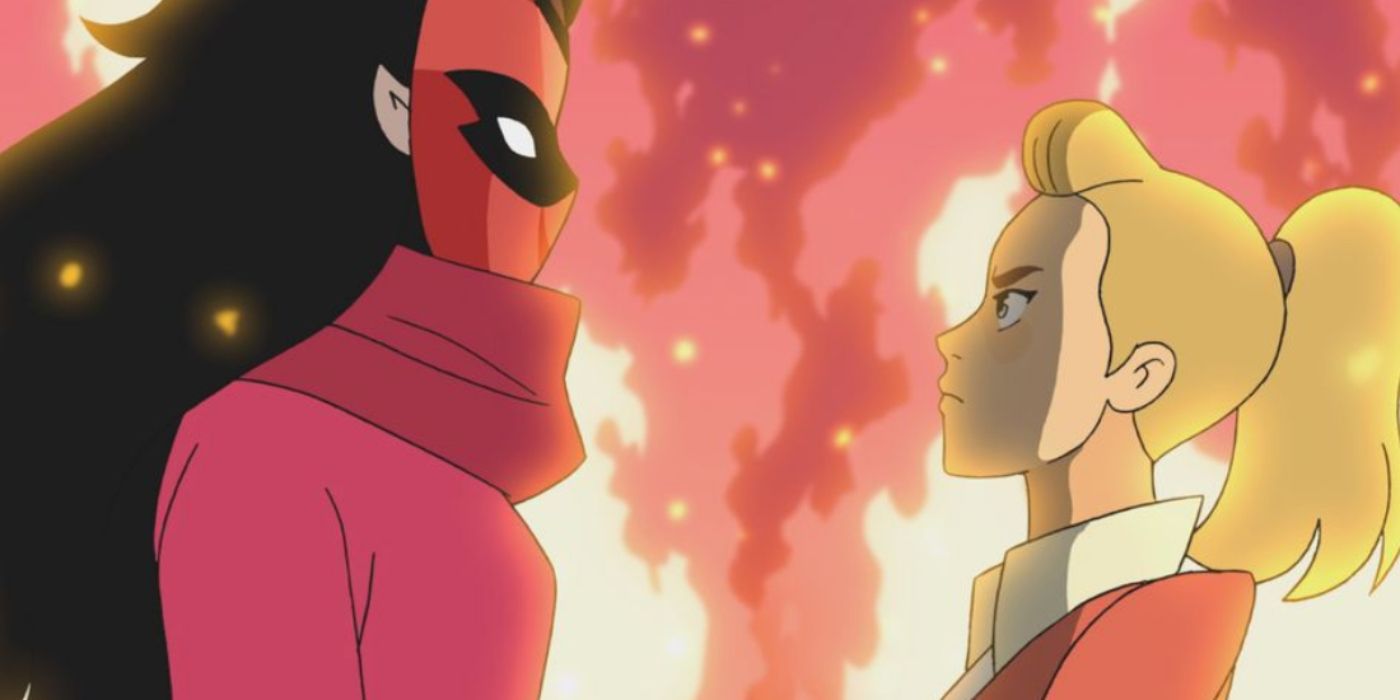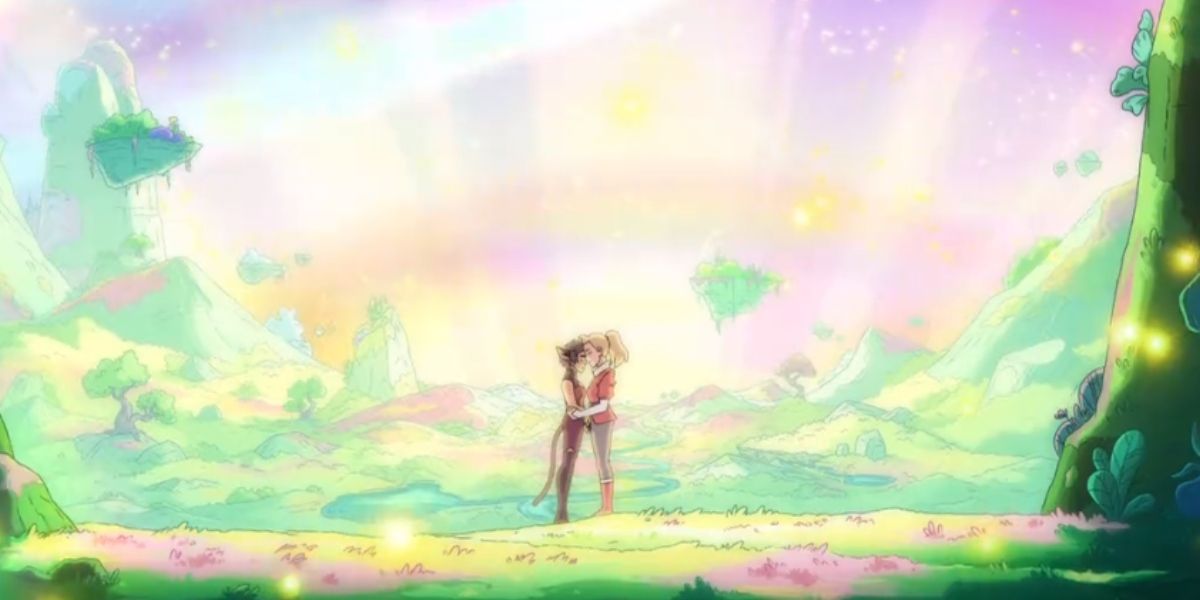WARNING: The following contains spoilers for She-Ra and the Princesses of Power Season 5, now streaming on Netflix
She-Ra and the Princesses of Power conclude on an impressive high note, with the fantasy epic managing to keep track of the deep character work that has long defined the show. Showrunner Noelle Stevenson spent some time speaking with CBR about the climax, and how the final episodes solidified the most important aspects of the series.
CBR: The romantic subplot between Adora and Catra finally reaches an emotionally satisfying climax in the finale, with the pair not only admitting their love for one another but even sharing a first kiss that saves the world. How long have you known their romance would be a major part of the climax? And was there ever the possibility it wouldn't come to pass?
Noelle Stevenson: I think it was definitely not always a given that we would be able to have this relationship as canonical and central as we were able to end up having. I really wanted to be careful in case it turned out that we couldn't have this relationship be so textual. I didn't want it to feel frustrating or like a betrayal. We were definitely trying to play it in a way that was sensitive early on, but I really think if you're going to go for it, then go for it. I think incidental representation and seeing it normalized in ways that are just a part of the fabric of the world that these stories take place in, that's really important.
But I also want to see those stories be central. I want to see them be the actual arc of the show. And having the opportunity to do that with Catra and Adora, in a way that spans all five seasons, it was risky. Sure. But this is what we're going to do. We just have to go for it and have it be something that's so central and important to the plot and the characters. [The show] really doesn't work without it. Getting it to the point where it felt realistic and it felt fulfilling and satisfying and earned, it was something we really worked hard on. It's really great to see the initial reaction to it. I wanted this to be what the show was about because I think this [relationship] really is what the show is about.
CBR: A major element of She-Ra and the Princesses of Power has always been partly about the question of choice and redemption, whether or not someone can become a better person. And while a lot of characters get the opportunity to go through that arc - like Catra, Shadow Weaver, even the original Hordak - that's not the case for Hordak-Prime, who is eventually eradicated by She-Ra. Is there any way that Hordak-Prime could have been redeemed?
Noelle Stevenson: I think because we as a show have so much interest in humanizing our villains, I really wanted Horde-Prime to be different. There is evil in this world. It's dishonest to say that everyone is capable or worthy of redemption. There are people who have stewed in their own hatred for so long that the only thing you can do is just... She-Ra banishes him. 'There's no place for you in this world.' If there was ever any good in Hordak-Prime, if there ever was love or kindness, this is someone who has prolonged his life for so long by taking over the bodies of others, for centuries.
Eventually, everything became about his ego about remaking everything the way he wanted it, remaking it so he had complete control over it. In its most mundane form, I think that is what evil is. In our world, people with worldviews so self-focused and so insular and don't extend to anybody but themselves - it's a simple concept at the end of the day. I think the people who can't see beyond themselves, I think that's what is evil in this world.
I don't think [Hordak-Prime] is the cause of that evil, I don't think he's made of pure evil. But I think because of the choices he made and the way he sees the world and the years and years of continuing to double-down on that and be so committed to that. At the end of the day, there's no way to redeem someone who doesn't want to be redeemed. There's no way to force them to care about other people if they don't. I love the way that She-Ra does that is by healing. She heals him out of Hordak's body. I think that's a choice. To break out of that evil, that's a choice that a person has to make, and I don't think [Hordak-Prime] is capable of that when we see him in the show.
CBR: A certain kind of redemption also plays at the heart of Shadow-Weaver's arc within the final episodes. While the character had nominally been an ally for a period, she never truly lost her antagonistic side - until the final moments of the series, where she finally acknowledged Catra in a humanizing way before sacrificing herself to save Adora and Catra. Was that always her eventual arc in the show?
Noelle Stevenson: Shadow-Weaver is a character who decides her own path through the story. You never really know what she's going to do. She's always revising her own plan and what she's going to do. It's very selfish, in a way. Her moral code is completely focused on her own well-being, but I think she really does think - from the moment she fled the Fright Zone and teamed up with the rebellion, she thinks she's a good guy. She thinks she's been redeemed, but she's still just in it for herself. She's always trying to figure out how to get power for herself. Even though she thinks she's doing the right thing by manipulating Adora, she really does think that doing that will be good for the world - but also for her. That's what she most cares about.
But she's also forced to confront the fact that she's ruined so many people's lives. She's faced with the fact that she's ruined Micah, she's ruined Castaspella, she's ruined Glimmer, she's ruined Catra, she's ruined Adora, all with her selfishness and her manipulations to try to get her way. This is the first time that she's ever confronted that about herself. Before that, anytime she was confronted about doing something wrong or evil, she'd just toss it off and say 'well there were mistakes but I'm not perfect.' I think she really has to confront the fact that she's a toxic person in the lives of pretty much everyone she knows. She does care about those people, and I think that's ultimately what leads to that turn for her in the end.
What I like about it is that it's still very fitting for her. It's still kind of a selfish end. It was something that Catra was also confronted with, 'maybe I've done so much wrong that the only way to make up for it is to sacrifice myself and die, and they'll have to forgive me cause I died saving someone.' Catra is forced to stick around and actually confront the mistakes she has made and actually fix them, becoming a better and more positive person through that. Shadow-Weaver makes that choice to just sort of peace out. Even that smug little smile at the end, that 'now you have to forgive me good-bye,' it's so her. I love it.
[Adora and Catra] need it, though. They still care about her, even as much as they hate her and are afraid of her and are traumatized by her. You don't just stop caring about people because you need to. That last little bit of affirmation gave them the closure they needed. I don't think that cancels out all the evil things Shadow-Weaver did in her life, but I think for Adora and Catra, that's what they needed.
CBR: Bow has always stood out as not just the emotional lynchpin for the "Best Friends Squad" but also the Princess Rebellion as a whole. He's almost been defined as being the positive "motivational speaker" of the team. In the finale, he gets to give one final massive speech to all of Etheria, inspiring them to fight on - even if they end up losing and falling against Hordak-Prime. Where did that idea come from?
Noelle Stevenson: The message of these last few episodes has been love. Love is the most important thing in the world, it's what makes us strong, it's what ties us together. I think Bow has always, he's got a heart on a chest. He's always been about love. I think his journey so much is that because he's always trying to be supportive, he's always trying to be so loving, he's always trying to take care of his friends, he doesn't always take care of himself. He doesn't always defend himself when people aren't looking out for him.
So much of his journey, this season is about drawing boundaries and putting his foot down and refusing to just immediately give forgiveness, especially for someone who really hurt him like Glimmer. I think that message of love coming from him has more meaning. The optimism that Bow always brought to the table before was always just 'no matter how bad things are, I will bring this cheer and optimism because that's what people need from me.' But here, that's not really there.
In a lot of ways, his speech is really pessimistic. 'I don't know if we will survive this. We might not. But we have to try, and we have to do this together because love is the most only thing we have.' I think of that as Bow really growing up. When we had [Marcus Scribner, who plays Bow] come in and do that speech... Marcus was sixteen when we cast him. He had a sixteen-year-old voice, he had natural voice cracks.
His voice has lowered over the course of the show. He still does a voice for Bow, he can still go back to that teenage register. But we started having him go into a lower, more natural register more and more in the last season. We had him do that speech in his lowest register. That's really him, that's Marcus you're hearing and he's really grown up. He's this leader that really manages to bring that message of love in a very sincere way and bring everyone in Etheria together.
CBR: The final episodes of She-Ra and the Princesses of Power are just as fitting and emotional as anything from the endings of Adventure Time or Steven Universe, both of which also ended on high notes. But She-Ra also doesn't close the story as defenitivly as those shows. In fact, She-Ra ends with the main cast planning out their next adventure, intending to bring magic back to the universe. Why was it important that She-Ra end this way?
Noelle Stevenson: I really pushed back against the idea of a time-skip and seeing the future. A lot of it might be based on my dislike on the epilogue from Harry Potter, but I think you always feel very blocked in when stories do that. 'Here they are in the future, this is the exact road they take'. I think that takes away so many possibilities. I think it's interesting that we did use that idea of a denouement in the last episodes. I was really against it for the longest time, but having a glimpse of a potential future where it's not quite clear the paths the characters have taken to get there... I think showing Adora a vision of a possible future was really important for her.
But overall, these kids have been fighting a war their entire lives, and suddenly the war is over. They don't have to be soldiers anymore, they can go where they want to go and be who they want to be. I think they're all adults at this point, and they can kind of be the kids they never got to be. I think that feeling, that open-endness where we can imagine what comes next for them, is more exciting than laying out exactly who they will be in the future. There are so many paths they could take. I think the show has always been about choice, the show has always been about deciding who you are and what path you want to take, and now the characters are free to do that. It felt like the perfect ending for what we were trying to say with this show.
She-Ra and the Princesses of Power stars Aimee Carrero, Karen Fukuhara, AJ Michalka, Marcus Scribner, Reshma Shetty, Lorraine Toussaint, Keston John, Lauren Ash, Christine Woods, Genesis Rodriguez, Jordan Fisher, Vella Lovell, Merit Leighton, Sandra Oh, Krystal Joy Brown and Jacob Tobia. It is currently streaming on Netflix.




